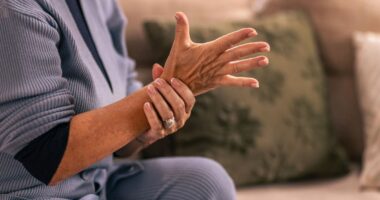Share this @internewscast.com
Eight in 10 Brits with regular pain issues are struggling with day-to-day living, according to research. A study of 2,000 adults found that physical ailments mean 40 percent of sufferers can’t remember the last time they had a full night’s sleep.
The same percentage can’t comfortably exercise, and three in 10 struggle with household chores – while 27 percent have trouble getting up and down stairs. Even getting dressed proves to be a near impossible task for 15 percent, while 19 percent can’t tackle DIY jobs.
However, 37 percent of all those polled have struggled to get appointments from their GP – and 23 percent of all patients hoping to see a pain specialist have been waiting longer than six months.
As a result, one in 20 have felt so desperate that they resorted to illicitly-sourced substances to help manage their pain.
The research was commissioned by Curaleaf Clinic as part of its “Painful Conversations” campaign, which aims to empower patients to take back control of their health, and explore alternative therapies when other treatments have failed.
Dr Emeka Okorocha said: “It’s disheartening to see some people resorting to extreme measures in an attempt to alleviate their suffering, sometimes with minimal relief.
“When conventional treatments don’t work, it’s possible to explore alternative therapies – but to do so with the input from trained medical professionals.
“Embracing non-traditional approaches can offer some hope for those in desperate need, where conventional methods might have fallen short.”
Of the 46 percent who are regularly prescribed medicine to help manage their pain or physical condition, 45 percent say it hasn’t helped – and six percent even say it has worsened, despite being prescribed medication.
More than four in 10 (43 percent) have taken more medication than recommended to manage their pain in the past 12 months.
And 16 percent report they have resorted to this often or very often – while 13 percent have taken medication that was prescribed to someone else.
The survey, conducted via OnePoll, also found that over half of adults in pain (56 percent) are still searching for a treatment that truly works – with 16 percent reducing their working hours, and 15 percent stopping working altogether.
Dr Simon Erridge, director of research at Curaleaf Clinic, added: “Being in constant pain is something that millions have to deal with – and, unless it’s part of your life, it’s hard to imagine what a toll it takes not only physically, but mentally as well.
“As a doctor I have heard this from patients first-hand, but ultimately there are limited options available for patients with chronic pain.
“This is one of the key reasons why I have spent the past five years dedicated to researching the effects of medical cannabis on pain, in the hope that we may be able to offer more options to people suffering with chronic pain in the future.”
This research builds on a 2022 study commissioned by the medicinal cannabis company, which legally prescribes the treatment for a wide range of conditions – and found that one in 10 patients with chronic pain are turning to illicit cannabis to treat it. However, just 52 percent know it is legally available for medical use.
One person who is aware of this is Jenn Sharp, 48, from North Greenwich in London, who has been diagnosed with osteoarthritis, multiple sclerosis, and functional neurological disorder – causing her to endure excruciating physical and mental pain over the years.
She had been prescribed numerous over-the-counter opioids and painkillers, but none of the medications proved to be effective – and, in many instances, led to her developing stomach issues, to the point she was forced to stop taking them.
For many years, Jenn was stuck in a cycle of recurring visits to her doctors to continue being prescribed medication and opioids that proved ineffective.
To avoid NHS waiting lists, Jenn was forced to take out private health insurance and see private doctors, which ended up costing her a substantial amount of money. In 2022, Jenn began using medical cannabis to alleviate physical symptoms of her osteoarthritis.
She said: “While I still live with the physical pain of my conditions, I’ve found a significant difference between when I use medical cannabis, compared to when I don’t, with the pain diminishing significantly.
“It has become an important part of my strategy to cope with pain, working together with my existing medication. Without medical cannabis I still find walking very painful – but when I am able to use it, I am able to get some relief.”














